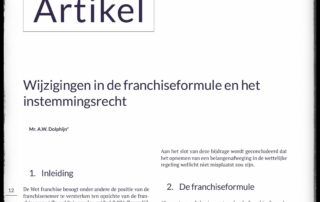Abuse of power in the French supermarket sector
After Belgium, France has now also had enough when it comes to abuse of power by supermarket organizations towards its franchisees. With unprecedented ferocity, both governments are targeting the supermarket organizations with almost decrees.
The French Ministry of Economic Affairs is intervening in a lawsuit filed by 170 Carrefour franchisees against their franchisor. On June 17, 2024, after a three-year investigation, which did not happen overnight, the Ministry wrote that there were unfair clauses in the franchise contracts in the supermarket sector and advised the court not only to annul these clauses but also to impose a fine on Carrefour. of 200 million euros.
This would involve dozens of unfair clauses. The ministry talks about the “suffocation” of franchisees and unfair trade and competition practices, which we in the Netherlands would generally refer to as “binding”. This dependence takes many forms. Consider, among other things, competition restrictions; financial dependence and significant investment obligations; restrictions through the rental agreement; (indirect) price maintenance and having to sell the store to your own organization in non-market conditions.
The bridge was quickly made. In the Netherlands too, supermarket entrepreneurs are becoming increasingly dependent, partly as a result of the consolidation in the supermarket sector. In mergers, entrepreneurs are sold over their heads and have formulas imposed on them that they can no longer break away from. The ACM does not sufficiently recognize their independent and dependent position. Only a few are able to cope with this and know how to guard their freedom. The majority are now completely dependent, which is especially felt in times of adversity. Many smaller supermarkets are being crushed in this violence and have to close. This also leads to a reduction in supply. In this sense, the supermarket sector differs considerably from other (franchise) retail. We see that the Franchise Act has been handled quite well on average by the other franchisors in the Netherlands, with some exceptions.
To date, both the ACM and the Ministry of Economic Affairs in the Netherlands have been little critical of this (too) dominant position. Entering and staying in the supermarket sector is now completely dependent on a few providers who can dictate the contract terms. I am curious about the views of our new Minister of Economic Affairs on the reports of her foreign colleagues.
Based on examples from legal practice, I would dare to state that the contracts and situations in the Netherlands hardly differ from the situation in Belgium and France. What also makes it difficult to bring the issue into the spotlight are the non-disclosure agreements with enormous penalty clauses, which means that very little is made public.
Under the Belgian presidency of the Council of the European Union, a report was recently published on (the need for) European legislation for distribution agreements, including franchise agreements. Our office recently attended the conference in Brussels where the results of this report were presented. The question is to what extent there is support for a European and/or national differentiation in the context of the evaluation of the Franchise Act between the franchise sector on the one hand and supermarkets on the other and/or for further regulation of this sector.
Our office is closely monitoring these developments. The final word now belongs to the French courts. In the meantime, it is important that you seek good advice from an expert specialist when entering into contracts in this sector.
Ludwig & Van Dam lawyers, franchise legal advice.
Do you want to respond? Then email to sterk@ludwigvandam.nl

Other messages
Changes to the franchise formula and the right of consent
An article by Mr. was published in the leading legal ...
The National Franchise podcast
Guests on the National Franchise podcast are: Theodoor Ludwig ...
(Im)possibilities in case of bankruptcy
The past few years have been a period with ...
Ludwig & Van Dam in Distrifood about the future of independent supermarket entrepreneurs
However, many retailers are now at a loss due to ...
No standstill period for prior collaboration based on the same formula
On December 29, 2023, ECLI:NL:RBDHA:2023:20931, the District Court of The ...
Standstill period: four weeks is and remains four weeks!
Standstill period: four weeks is and remains four weeks! ...







